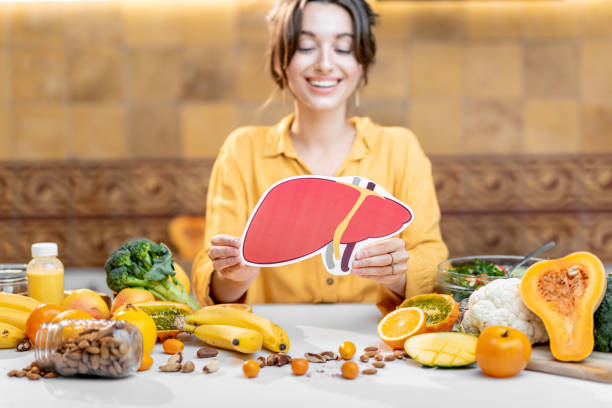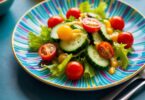Our liver is a vital organ that helps us metabolize our food and keep us healthy.
The liver is one of many places where the body stores fat for insulation and energy. A fatty liver is when the liver’s fat content becomes excessive.
When our liver gets damaged by disease or dietary factors, it can no longer do its job properly, which can lead to serious health problems like fatty liver diseases and even death.
The first resort treatment for a fatty liver condition is a change in diet.
Diet plays a critical role in treating fatty liver disease because the condition is closely linked to the types and amounts of food a person consumes.
Fatty liver disease is characterized by the accumulation of excess fat in the liver cells, and a diet high in saturated and trans fats, simple sugars, and refined carbohydrates can contribute to the development and progression of the disease.
By adopting a healthy diet, individuals with fatty liver disease can help to reduce the amount of fat in their liver, decrease inflammation, and improve liver function.
In this article, you will find out the ten healthiest foods for fatty liver disease.
10 Healthiest Foods For Fatty Liver
Here are some of the healthiest foods for fatty liver:
1. Fish and Shellfish
Fish and shellfish are generally considered good for fatty liver disease because they are rich in omega-3 fatty acids, which have been shown to have anti-inflammatory properties and may help to improve liver function.
Omega-3 fatty acids have been shown to reduce blood pressure and liver fat.
Eating fish and shellfish can also help to reduce the intake of red meat and processed foods, which can be high in saturated and trans fats that contribute to fatty liver disease.
Some types of fish that are particularly high in omega-3 fatty acids include salmon, sardines.
2. Oysters
Oysters are delicious and nutritious food. They are one of the healthiest foods for liver and kidney health.
If you have fatty liver, oysters can be an effective way to help your body fight off the disease. They’re rich in zinc, which is an essential mineral for cell health and growth.
Oysters also contain high amounts of vitamin B12 (which helps maintain healthy red blood cells) and selenium (a mineral that helps prevent cancer).
They’re also a good source of omega-3 fatty acids–good fats that help reduce inflammation in the body.
3. Coconut Oil
Coconut oil is a great source of medium-chain triglycerides (MCTs). MCTs are a type of fat that’s easily digested and converted into energy.
MCTs can help you lose weight, boost your metabolism and reduce inflammation.
Coconut oil also contains Lauric acid–a unique form of saturated fatty acid that has been shown to improve cholesterol levels by lowering bad cholesterol levels.
4. Almonds and Walnuts
Almonds and walnuts are great sources of vitamin E, which is important for liver function. They also contain omega-3 fatty acids and antioxidants, making them an excellent choice if you’re looking to improve your health by improving the health of your liver.
Walnuts are rich in antioxidants such as polyphenols (which help fight free radicals) and flavonoids (which reduce inflammation).
This can help combat fatty liver disease by reducing inflammation caused by toxins in our bodies that damage cells throughout our bodies.
5. Whole Grain Bread
Whole-grain bread is the best choice for fatty liver. They are lower in carbs and calories, have a higher fiber content than refined grains, and have been linked to a lower risk of diabetes, liver damage, and heart disease.
6. Nuts and Seeds
Nuts and seeds are a good source of protein, fiber, healthy fats, and heart-healthy monounsaturated fats. They can also help you feel full for a longer time, which prevents overeating.
7. Vegetables with a High Water Content
Vegetables with a high water content are excellent for helping you lose weight and keep it off. They are also great for improving liver function, digestion, hydration, and overall health.
For example, vegetables such as celery, cucumber, iceberg lettuce, tomato and zucchini contain over ninety percent water.
8. Legumes
Think of legumes as the “slow-burn fuel” your liver loves. Lentils, chickpeas, and beans digest gradually, keeping blood sugar stable and reducing the metabolic stress that drives fat into the liver.
Researchers found that people who ate more legumes had significantly lower odds of developing non-alcoholic fatty liver disease. The takeaway? A bowl of lentil soup isn’t just comfort food , it’s metabolic medicine in disguise.
9. Turmeric
Turmeric, and particularly its active compound curcumin, has been widely studied for its anti-inflammatory and antioxidant properties.
For individuals with fatty liver disease, curcumin supplementation has been shown to reduce liver fat content and improve liver enzyme profiles.
A 2023 study confirmed curcumin’s potential in improving liver function tests in patients with non-alcoholic fatty liver disease (NAFLD).
10. Apples
Apples might be the most unassuming liver ally in your fruit bowl.
Beyond their crisp sweetness, they’re packed with soluble fiber (pectin) and polyphenols that help regulate cholesterol and fight oxidative stress.
Apple has polyphenols that improves lipid metabolism and reduced oxidative damage, two key drivers of fatty liver disease.
So, when you’re reaching for an afternoon snack, that apple isn’t just a filler, it’s a quiet defender of your liver health.
Remember to:
- Eat healthy diets and exercise regularly.
- Avoid alcohol and other drugs that may cause fatty liver disease.
Conclusion
This blog post has given you some ideas for healthy foods to feed your liver. The best part about eating a diet high in these nutrients is that it’s easy to incorporate them into your daily routine, so there are no excuses! You can include them in just about anything you eat, and they won’t cost much money or time either. Plus, now that you know what they do for your bodies, you should all be more mindful of how your food choices affect health over time and ensure you keep them in mind when making decisions about what goes onto your plates.








